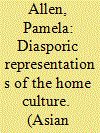| Srl | Item |
| 1 |
ID:
076400


|
|
|
|
|
| Publication |
2007.
|
| Summary/Abstract |
Throughout periods of political instability and economic adversity - from Dutch colonial rule, through President Suharto's period in office, to more recent times - ethnic Chinese in Indonesia have been recurrent scapegoats for violence. Suharto, especially, manipulated local perceptions of the Chinese in the economic and political arenas, to suit the needs of his government. Yet, circumstances have changed since the 1998 riots in Indonesia and Suharto's departure. Subsequent presidents have introduced legislation aimed at reducing legal restrictions on Chinese Indonesians and they, in turn, are beginning to have greater public voice through a diversity of outlets. These include the growth of numerous new print and television media; a flourishing literature sphere; the rise of a variety of political parties, both ethnicity-based and more wide-ranging; and the development of non-political organisations, some tackling discrimination and others focusing upon Chinese sociocultural needs. These channels are facilitating the appearance of new and re-emerging ethnic Chinese identities, some surfacing from over 30 years of imposed dormancy. This paper is a preliminary investigation of manifestations of these identities among ethnic Chinese in Indonesia's contemporary public realm.
|
|
|
|
|
|
|
|
|
|
|
|
|
|
|
|
| 2 |
ID:
139457


|
|
|
|
|
| Summary/Abstract |
The focus of this paper is the ways in which certain customs and traditions are actively selected and/or reinvigorated and subsequently authorised, by institutions or by individuals, as being key markers of the culture of the ‘homeland’. The cultural practices chosen for discussion are the kejawen mystical system as practised in Suriname and the acquisition of the Indonesian national language, bahasa Indonesia, in New Caledonia. The discussion is informed by two key ideas. The first is that immigrant communities designate certain cultural practices as being worthy of preservation as an ‘inheritance’ for the future. The second is the interplay between cultural practices and power or authority, which gels in scholarly discussions about ‘cultural heritage’. I argue that the continuation of a cultural practice or tradition lies as much with its authorisation by key individuals or institutions as it does with its purported authenticity.
|
|
|
|
|
|
|
|
|
|
|
|
|
|
|
|